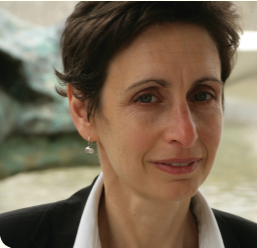It’s Not Easy Teaching Green
Author Elizabeth Kolbert Takes the Stage at Campbell Hall

Imagine you’re in a classroom, it’s the first day of the quarter, and the teacher walks in and-without speaking-writes on the board, “The Earth, as we know it, is going to die.” That would be sure to get your attention and, most likely, have you thinking it’s time to drop the class, post haste.
This scenario is pretty much what New Yorker writer Elizabeth Kolbert faces. On April 19 she spoke to a packed Campbell Hall at UCSB and criticized her own book-Field Notes from a Catastrophe: Man, Nature, and Climate Change-by claiming, “We have to drastically change our lifestyles and priorities, but if I advocated that, the book would have seemed too radical. I had to figure out how to write about climate change without seeming alarmist. But what is the scope of the problem? I don’t think it can be overstated.”
In essence, she faces education at its toughest. How do you teach people a lesson they don’t want to learn? It’s harder than facing a room of 25 freshman faces convinced they don’t need to know anything about writing. After all, even if they fail a writing class, they don’t have to worry about their seaside house ending up under the ocean, or their food supply cut-off because of crippling drought.
Of course it is in everyone’s best interest to figure out how to slow down climate change (we can quibble, but from Kolbert’s overview of the research there is no stopping it). Still, it’s easy for us to say, “If everyone isn’t pitching in, why should I?” After all, we like our big cars, jetting away to exotic locations, using plenty of electricity (you’re reading this on the web, after all). It’s easy to assume we can’t do anything, so why not carpe diem while we still have a diem to carpe?
Teachers know there really are only two motivators-sticks and carrots. Turns out we have a bit of both to help us learn the tough lessons about climate change. That polar bear stranded on its ice floe is one sad “stick.” That higher ocean temperatures make stronger hurricanes that can wipe out poorly engineered levees and can sink a town as lively as New Orleans is another. That global warming can lead to drought in Africa, which can lead to genocide in Darfur is another example. So we have plenty of images that should make us say, “Let’s stop this nonsense,” or at least, “Can we reduce our carbon emissions 20-30%?” and, “Where do I buy compact fluorescent light bulbs?”
As for carrots, Kolbert put that one best, “I’m not wildly optimistic we’re moving in the right direction, but we all went out and had children in the face of this knowledge. We seem to ourselves a special kind of organism, one that’s conscious of what it’s doing and therefore capable of changing its behavior. It’s the triumph of hope over experience.”
Perhaps life-long learning means nothing more than that, discovering our mortality informs our morality.
George Yatchisin, who taught college writing for 13 years, is the Communications Coordinator for the Gevirtz Graduate School of Education.



